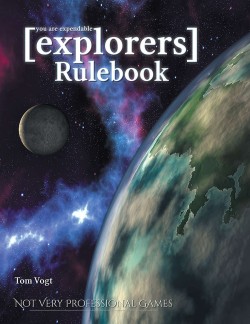Explorers Core Rulebook
 |
It is the year 376 in the Galactic Human Empire¸ mostly just called The Empire. Humanity spans a hundred thousand worlds in as many solar systems. Poverty¸ scarcity¸ disease and even work are curiosities of history. Spending their days in a perpetual holiday¸ engaged in philosophy and arts or simply in relaxation and fun¸ humans of The Empire are living a good life. You are not a human. At the edge of human space¸ genetic clone slaves are guarding the borders of The Empire against aliens¸ and exploring and preparing new worlds for the growing human population to settle or exploit for resources. Of course¸ exploration of new worlds is dangerous and many explorer teams never return to mission control. No sane person would risk real human life on such a dangerous adventure. You are an Explorer. You are a clone. You are expendable. [explorers] Overview Every roleplaying game has different assumptions and core ideas. Some games are horror games focussed on internal conflict¸ others are epic adventures focussed on the heroes defeating hordes of enemies. Different games appeal to different players and require different approaches. So here is what [explorers] is intended to be: cooperative modular narrative cooperative In [explorers]¸ the players are a team working together towards a common goal. There is a little space for conflicts within the group and players who enjoy conflict-play should find a different game. It also means the game is not suitable for solo play. A group of 4-6 players is probably perfect. It doesn't mean characters cannot exchange quips or be of different opinions. It does mean that a base level of cooperation between player characters should be considered a given. There is never a question why the characters are working together (they have been selected as a team¸ simple as that) nor would conflicts between them be allowed to continue by mission control (one or both of the squabblers would be retired or assigned to a different team). modular [explorers] is played as a series of individual missions¸ not as a campaign. It is fully intentional that there is no big storyline and the background material is intended to set a mood¸ not provide play material. This modular concept makes the game suitable for both fixed groups and groups that meet irregularly or that change composition often. Like an episodic TV show¸ it is the characters that bind the individual stories together. All game mechanics¸ from requisition to the automatic healing of all injuries between missions¸ are designed to isolate individual missions from each other. Starting a new mission in [explorers] is starting from a clean slate. narrative There are various approaches to roleplaying¸ all of them equally valid¸ but appealing to different kinds of players. [explorers] is a mostly narrative game¸ where the focus lies on telling a story together. The rules are designed to give a reasonable level of realism¸ but they are not intended to be a simulation. [explorers] is not¸ however¸ a game about character narratives. On the one hand¸ character advancement is possible¸ but even very experienced characters will not be several times as powerful as beginning characters. On the other hand¸ character motives and goals are clear by definition and while some missions might provide questions of morals and motivation¸ in general the team will be in conflict with the external world¸ not their inner demons. There is a strong element of challenge and overcoming obstacles in the game¸ no doubt. It is¸ however¸ designed to make narration the primary tool to overcome these challenges. [explorers] is not about gathering up the right artefacts and building up enough bonuses to finally overcome the boss monster. Contents: The rulebook contains a background world description and game mechanics for a science-fiction roleplayin